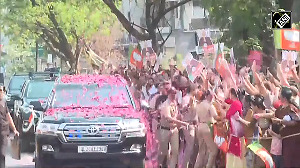The Supreme Court on Monday issued a notice to the Bharat Swabhiman Trust run by Baba Ramdev, saying it wants to hear its version over the eviction of the yoga guru and his supporters from Ramlila Maidan.
A vacation bench comprising justices P Sathasivam and A K Patnaik issued a notice to Acharya Virendra Vikram, the president of the Delhi unit of Bharat Swabhiman Trust. The apex court said it wants to hear the other side as a chance should be given to them to represent their stand.
The court told senior advocate U U Lalit, who appeared for the Delhi police, that the police had made several allegations against Baba Ramdev and his followers and the other side should also be heard.
The Supreme Court posted the matter for July 11 for the next hearing.
In an affidavit, the city police had told the court that no force was used against the protesters but only eight teargas shells had been lobbed to disperse Ramdev's supporters after they turned violent and started pelting stones.
Justifying its action, the police had said the authorities had given permission to Baba Ramdev to use the ground only to hold a yoga camp.
Instead of holding a yoga camp, said the police, Ramdev was "instigating" the crowd during his fast on the issue of corruption and black money at the ground where more than 20,000 people had gathered.
The Delhi police had filed the affidavit following a direction of the apex court, which had taken suo motu note of the police crackdown and had directed it to explain why it resorted to such action against Ramdev and his supporters.











 © 2025
© 2025